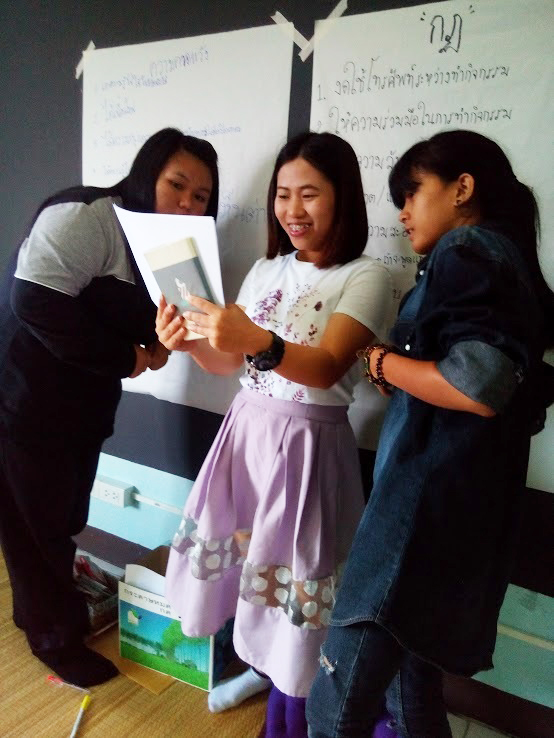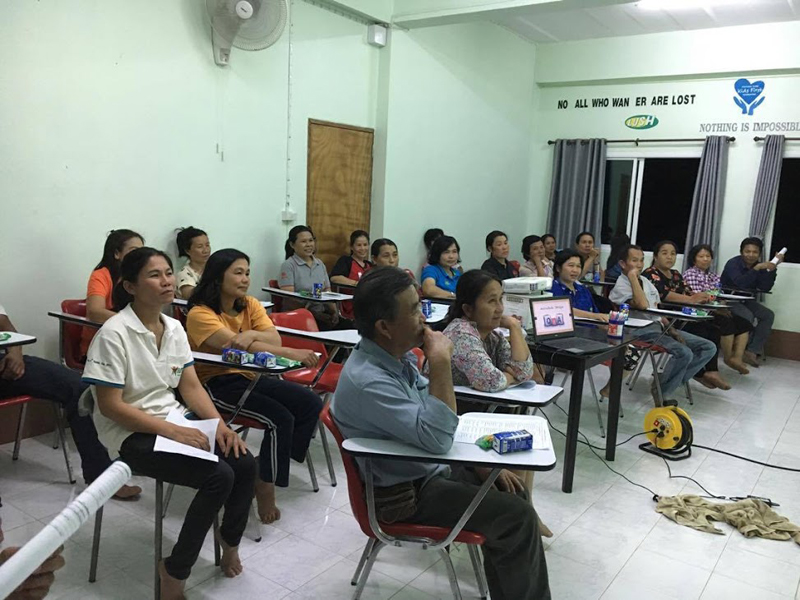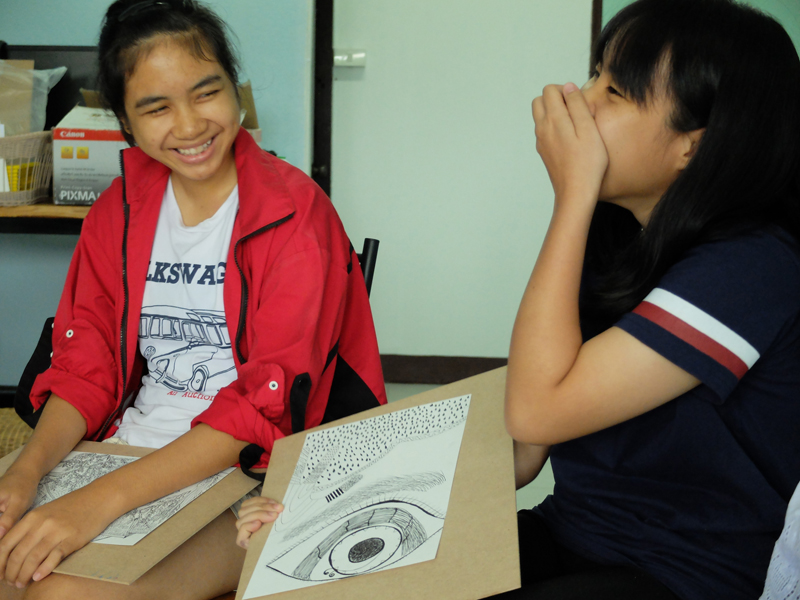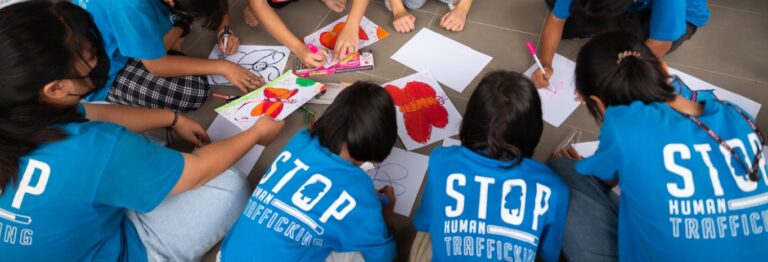A guest post by Lisa Winterfeldt
Recently, we published a blog post on the connection between mental health and prevention in which Amm Chutima, a professional in the field of counseling and holistic care in Thailand, outlined the major challenges to adequate care in mental health. One of the biggest challenges she mentioned counselors and psychologists face in Thailand is the prejudice against and intolerance for those who have mental health problems. As Chutima explains, “Most Thai people lack valid knowledge and understanding about mental problems. They perceive people seeking counseling or treatment as insane. Thus, [people who need help] are ashamed to seek counseling or treatment.”
I’d like to shine a light on two of the Freedom Story staff, Lux and Khae, who are breaking through these stereotypes and barriers to provide counseling and support to kids and families in the villages, as well as educate and change the mindset of villagers about various mental health issues.
Lux
Lux (pictured above) graduated from Chiang Mai University with a degree in Clinical Psychology and has been working with The Freedom Story since 2016. She got her degree in Psychology because she wanted to learn about the strengths and weaknesses of her own mind so that she could eventually help others do the same. She wants to help people with mental health issues and teenagers with mood disorders to learn how to help themselves. Her dream is to help local Thai communities become knowledgeable and change their negative thoughts about students with mental health issues, as well as Psychology as a subject. Once accepted into the community, her hope is these students can get the support they need to continue to be successful in life.
Khae
Khae has been working with The Freedom Story since 2012 in various roles including mentoring, activities, and the sustainability program. Before coming here, Khae worked as a mentor with students at Narasuwan University and then also took on the role of mentoring and building relationships with the scholarship students at The Freedom Story. When she did home visits and talked with the kids, she saw many problems in family relationships, emotions, and friendships. As she became more involved in this role, she realized she wanted to educate herself more and is now getting her Masters in Counseling Psychology from Chiang Mai University so she can become a certified counselor. In addition to seeing clients, she is working together with Lux to develop an awareness program to educate the local communties. Her dream is to be a counselor and help the kids in The Freedom Story have good experience with counseling and learn skills necessary to help themselves. She wants the people in the community to have healthy lives and and good mental health. She wants to help people in Thailand to understand why counseling is important and change their mindset to see it as a positive tool in life.
Mental Health as a Function of Karma in Thai Society
Often in Thai communities, people don’t understand mental health, counseling, or psychology and they aren’t open to learning about it because they don’t see it as important. A common belief is that if someone has mental illness or disorder, it is part of their fate or destiny and they should go to the temple or visit the monk for blessing and forgiveness. There is a sense of embarrassment and shame around mental health, and often people that suffer are believed to be bad and kicked out of their village, often to a government home without services or support. The people don’t understand that mental health problems are a condition that can be treated or helped.
A common belief is that if someone has mental illness or disorder, it is part of their fate or destiny and they should go to the temple or visit the monk for blessing and forgiveness.
Lux and Khae realized the importance of education as a powerful tool in helping change the mindsets that have existed for years in the villages. Lux explained, “The first way to address this is to do community outreach and education programs to teach communities about issues like mental health disorders, phobias, teen depression, suicide, alcoholism, etc. and about the treatments. Once they are educated about the problems, they will be more open to receiving counseling.” Khae went on to share that, “Students are afraid to go to counseling because they don’t want others to judge them negatively or refuse to be friends with them.”
Introducing Change
One program that the team hosted was a “Teen Mental Health” workshop. Twenty-five local villagers attended the training and were taught about topics like depression, stress, bipolar disorder, phobias, and alcoholism. In addition to education about these issues, she also provided tips and training on how to acknowledge, accept, observe, and help teenagers that are suffering. The parents were engaged and open to learning and The Freedom Story gives them a safe community to come and share and learn together.
Some other activities that the counseling and awareness team led were a Valentines Day “I love myself” activity, that promoted self-esteem and healthy relationships as well as sex-education for teenagers, and an online exploitation training for students, that taught students the risk of using online platforms and prepared them to recognize and protect themselves against this kind of exploitation. They have also led several activities promoting healthy emotional expression including a mandala art activity, an emotional intelligence camp to teach students what emotional intelligence means, and a hormone camp, where students learned about sex-education, healthy relationships, and stress relief techniques.
Other times, the staff go into local communities, like Baan Pak Ping foster home for abused girls, to provide group counseling activities. Programs like this allow the staff to reach more vulnerable children to provide emotional growth and support through art therapy and activities that promote communication, relationship building, self-esteem building, and positive expression of emotions.
Helping Staff as Well as Students and Families
In addition to working with students and training community members, the team has also provided training for the other Freedom Story staff. Khae led a training on the proper way to handle emergency case situations in regards to mental health and emotions, so that all of our mentors will be best prepared to handle any situation that might present with our students.
Also this year, the team has started doing group and individual counseling with a few students. One student, who had run away from home, began counseling sessions with the staff and has since reunited with her family and is continuing to work through her emotions to continue to build positive relationships and stay in school.
Education is the foundation of change and the outreach programs the girls are organizing and running have been helping breaking past cultural stigmas to help the Thai people start to understand and thus change their perspective in regards to mental health.








